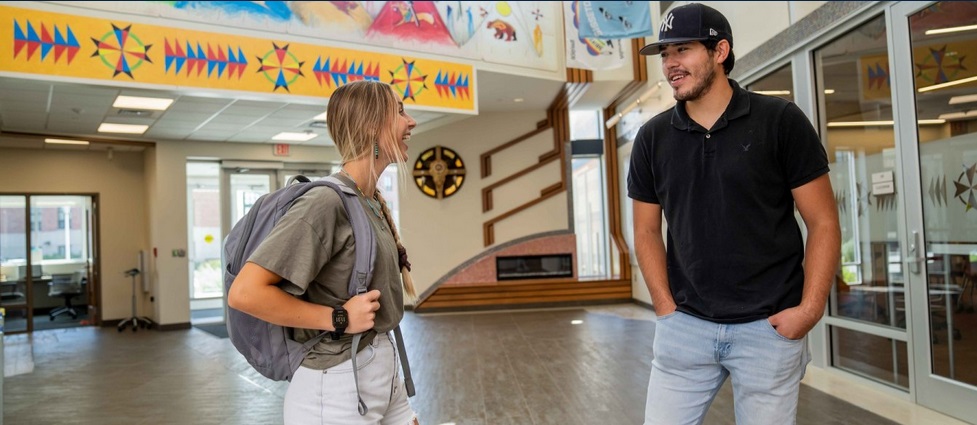|
|
|
Dec 03, 2024
|
|
2024-2025 Undergraduate Catalog
American Indian and Indigenous Studies (B.A.)
|
|

 

Program Coordinator/Contact
Jamie Folsom, Assistant Professor of American Indian and Indigenous Studies
School of American and Global Studies
Lincoln Hall 227, Box 2212
605-688-4087
Program Information
The American Indian and Indigenous Studies program prepares critical thinkers for living in an interrelated world with the rigorous engagement of Indigenous intellectual traditions, interdisciplinary theories, methods and community engagement. Indigenous languages and narratives provide a grounding for the development of Indigenous leadership. Coursework provides an understanding of American Indian and Indigenous worldviews as lenses to comprehend traditional knowledge and culture, and a basis with which to view the process of colonization and decolonization of Indigenous peoples and lands.
Course Delivery Method
Courses for the American Indian and Indigenous Studies major are delivered in face-to-face and online environments, utilizing lectures, discussions, and applied learning.
|
Student Learning Outcomes
Graduates will:
- Identify and analyze the trajectory of colonization and decolonization among Indigenous peoples in the North American context.
- Apply a theory of Indigenous worldview to effectively demonstrate cultural difference among Indigenous peoples and between Indigenous and non-Indigenous peoples.
- Apply an Indigenous methodological lens towards a research project benefitting Indigenous communities.
- Critically analyze and evaluate contemporary Indigenous issues working across academic disciplines to further the process of decolonization and Indigenization.
- Analyze the cultural and linguistic translations evident in American Indian and Indigenous Studies to develop decolonizing and Indigenizing discourses.
Requirements for American Indian and Indigenous Studies Major: 120 Credits
Bachelor of Arts
System General Education Requirements
- Goal #1 Written Communication: SGR #1 Electives Credits: 6
- Goal #2 Oral Communication:
- Goal #3 Social Sciences:
- Goal #4 Arts and Humanities:
- Goal #5 Mathematics:
- Goal #6 Natural Sciences:
College of Arts, Humanities and Social Sciences Requirements
Bachelor of Arts Requirements: 6+
- Modern Foreign Language Including the 202-Level Credits: 6+
- One declared minor outside of the major discipline OR a second major OR a teaching specialization. The minor may be a traditional minor within one department or school or it may be interdisciplinary involving more than one department or school. The minor can be in a different college. The minor must be declared no later than the student’s third semester of enrollment.
- Capstone course in the major discipline
- Upper division coursework Credits: 33
System General Education and/or major coursework may satisfy some or all of the above requirements. Consult program advisor for details. See the College of Arts, Humanities and Social Sciences for additional information about Bachelor of Arts specifications.
Select from the following
Select eighteen credits from the following. Credits: 18
Electives
Taken as needed to complete any additional degree requirements.
Total Required Credits: 120
Summary of Program Requirements
Bachelor of Arts
|
| System General Education Requirements* |
30 Credit Hours |
| College of Arts, Humanities and Social Sciences Requirements** |
6+ Credit Hours |
| Major Requirements |
38 Credit Hours |
| Electives*** |
52 Credit Hours |
*System General Education Requirements for students pursuing a baccalaureate degree shall include a minimum of 30 credit hours. Some general education coursework may be counted for Major Requirements, Supporting Coursework, and College Requirements.
**System General Education Requirements, Major Requirements, and Supporting Coursework may satisfy some or all of the above requirements.
***Taken as needed to complete any additional degree requirements.
Academic Advising Guide Sheet
The goal of the academic advising guide sheets and sample plans of study is to promote undergraduate student success by guiding all students to timely completion of an undergraduate degree. Students are not limited to the course sequence provided for their academic program. Instead, the sample plan of study is one possible path to completing your degree and is meant to be used as a guide for planning purposes in consultation with an academic advisor. The plans also help students prepare for meetings with their academic advisor and track their progress in their selected academic program.
|
|
|
|